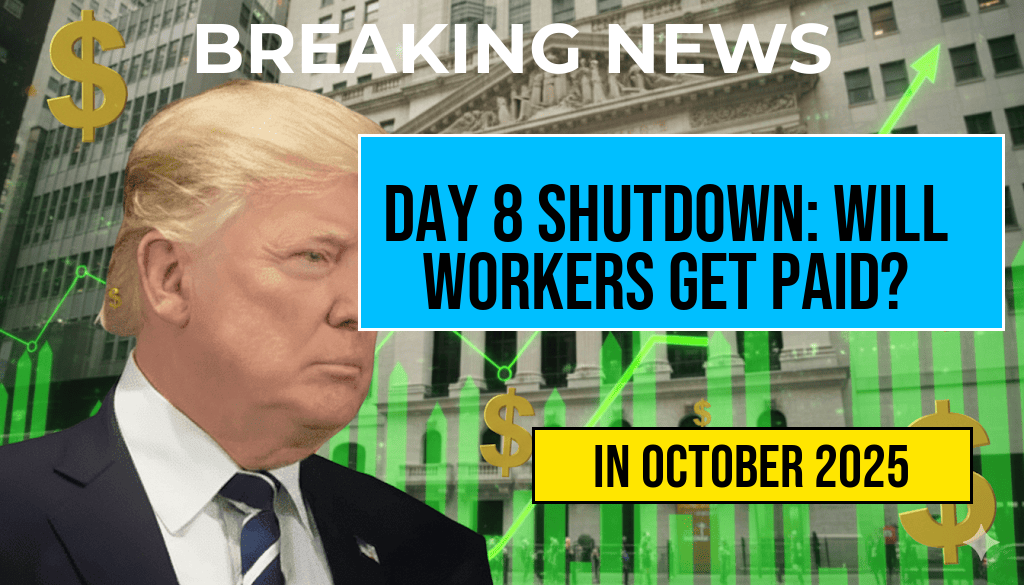As the federal government enters its eighth day of a shutdown, thousands of federal workers remain in limbo, uncertain whether they will receive their full paychecks or face financial hardship. The partial shutdown, triggered by a political impasse over funding legislation, has suspended a wide range of government services and furloughed approximately 800,000 employees. While lawmakers debate a resolution, the immediate concern for many workers centers on their pay status—some fearing they may not see their paychecks at all, or face significant delays. The situation underscores the broader economic and social impacts of prolonged government closures, which ripple through federal agencies, contractors, and the millions reliant on federal programs.
Current Status of Federal Worker Payments
As of Day 8, federal workers have not received their scheduled paychecks, with the U.S. Office of Personnel Management (OPM) confirming that salaries for most federal employees are on hold. According to federal law, employees typically receive paychecks on a biweekly basis, but during a shutdown, funding for most agencies ceases, halting payroll processing. The Office of Management and Budget (OMB) has indicated that, in the absence of appropriations, agencies are unable to disburse federal salaries, leaving many workers in financial uncertainty.
Legal and Policy Framework
Federal employees are classified into different categories based on their roles and funding sources. Most civilian employees are considered “excepted” or “essential,” meaning they are required to work during a shutdown but may not be paid until funding is restored. Conversely, the majority of furloughed employees are classified as “non-essential” and are placed on unpaid leave. The Anti-Deficiency Act restricts agencies from incurring obligations or making expenditures in the absence of appropriations, thus preventing payroll processing during a shutdown.
Will Federal Workers Receive Full Pay or Nothing?
Federal law stipulates that, in most cases, workers will not receive their paychecks during a shutdown unless Congress acts to provide retroactive funding. Historically, Congress has often approved bills to ensure back pay once the shutdown concludes. However, this does not guarantee immediate compensation for the period of unpaid work. Some agencies have announced plans to disburse back pay once appropriations are restored, but delays are possible, creating financial strain for many employees.
| Employee Category | Work Status | Pay Status |
|---|---|---|
| Essential/Excepted | Work during shutdown | Paid retroactively after funding resumes |
| Non-essential/Furloughed | Not working | No pay until funding is restored |
Impacts on Federal Employees and Economy
The financial uncertainty is forcing many federal workers to rely on savings, emergency funds, or credit to cover basic expenses. Some have expressed concern over missed mortgage payments, utility bills, and other essential costs. The American Federation of Government Employees (AFGE) estimates that about 70% of federal workers live paycheck to paycheck, amplifying the stress brought on by the shutdown.
Beyond individual hardship, the shutdown’s economic repercussions extend to businesses that contract with the federal government and services that depend on federal funding. According to the Congressional Budget Office (CBO), prolonged shutdowns can reduce GDP growth and increase unemployment, highlighting the broader economic vulnerability stemming from political deadlock.
Political Dynamics and Prospects for Resolution
The shutdown stems from disagreements over federal spending priorities, notably funding for specific programs and border security measures. Democrats and Republicans remain at an impasse, with negotiations focused on budget allocations rather than a clear path to reopening the government. Leaders from both parties have signaled a willingness to negotiate, but no immediate deal has emerged.
President Joe Biden has called for Congress to pass a clean funding bill, emphasizing the impact on federal workers and national services. Meanwhile, House and Senate leaders are under pressure from their constituents and industry groups to find common ground quickly. The ongoing deadlock underscores the challenges of bipartisan cooperation in a politically divided Congress.
What Federal Workers Should Do
- Stay informed through official channels like OPM and agency communications.
- Monitor pay statements for updates on payroll disbursement.
- Consider applying for emergency loans or assistance programs offered by federal employee unions or community organizations.
- Prepare for potential delays by budgeting carefully and exploring alternative income sources.
Looking Ahead
While the immediate question remains whether federal workers will receive their full pay or see their paychecks withheld, the resolution hinges on congressional negotiations. Historically, Congress has authorized back pay after shutdowns, but the timing and certainty of such measures are uncertain. As lawmakers continue discussions, federal employees and the broader economy remain vulnerable to the ongoing political stalemate.
For updates on the shutdown and its impact on federal workers, reputable sources such as CNN and the NBC News are closely tracking developments, providing timely, verified information to the public.
Frequently Asked Questions
Will federal workers receive their full pay during the 8th day of the shutdown?
Currently, federal workers are uncertain whether they will receive full pay or face missed wages during the ongoing shutdown on Day 8. The situation depends on congressional decisions and government funding resolutions.
What are the potential impacts of the shutdown on federal employees?
During the shutdown, federal employees may experience pay delays, furloughs, and disruptions to government services. Essential workers may continue working without immediate pay, while others could be sent home.
Is there any legislation that guarantees pay for federal workers during a shutdown?
Legislation such as the Fair Labor Standards Act and previous government shutdown laws often ensure back pay for federal employees affected by shutdowns. However, the timing and certainty of these payments can vary depending on congressional actions.
How long could the shutdown last, and what are the implications?
The duration of the shutdown remains uncertain, with potential implications including delayed government operations, public services, and federal employee compensation. Prolonged shutdowns can exacerbate financial hardships for government workers.
What actions can federal workers take if they are concerned about their pay?
Federal workers should stay informed through official government channels and consider consulting financial advisors for managing cash flow. In some cases, they may also seek emergency financial assistance from relevant agencies.










